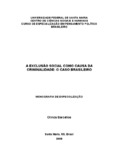| dc.contributor.advisor | Perez, Reginaldo Teixeira | |
| dc.creator | Barcellos, Olinda | |
| dc.date.accessioned | 2016-02-23T15:47:14Z | |
| dc.date.available | 2016-02-23T15:47:14Z | |
| dc.date.issued | 2008-11-22 | |
| dc.date.submitted | 2008 | |
| dc.identifier.uri | http://repositorio.ufsm.br/handle/1/1269 | |
| dc.description | Monografia (especialização) - Universidade Federal de Santa Maria, Centro de Ciências Sociais e Humanas, Curso de Especialização em Pensamento Político Brasileiro, RS, 2008. | por |
| dc.description.abstract | The chosen subject intends to analyses the question of the social exclusion, through the growth of the Brazilian economy, as one of the causes of the growing increase of the criminality. Considering that the criminality is one of the main problems the Brazilian society faces, beside the unemployment, it seems important to do an analysis of the criminality conjugated to the problem of the social exclusion in the Brazilian society that, in theory, lives in a phase of economical growth and searching development. The methodological approach is based in a theoretical revision of the relevant literature about criminality, social exclusion and economical growth. The statistical data used in this paper is from this sources: Institute of Applied Researches (IPEA), Brazilian Institute of Geography and Statistic (IBGE), Ministry of Health – Informational System of Mortality (YES – Datasus) and the National Office of Public Security (SENASP) of the Ministry of Justice (MJ). The inquiry to explain the criminality the research to explain the criminality is very spacious and there is not a universal truth, it has very much to do with the historical moment and the culture of the place. The causes of the criminality, according to the specialists, are originated in the sociology, in the psychology, in the economy and in the rights; without forgetting that the management men of the public security area still need to take lessons with the administrators, because they administer the scarce thing. The public security is a quite scarce one. To treat the criminality of one only form is impossible. If, on a side, the population grouping, the unemployment, the lack of public efficient politics, a late system of criminal justice are causes of the criminality; for other, Brazil grew economically and even so did not reduce the inequality, so it is possible to conclude that is taking place in the country a paradox: the economy grows and also the criminality grows. The economical theory of Gary Becker is still adapted to Brazil, the crime being able to be considered an economical activity, with all the risks and profits. The conclusion is that the exclusion driven by the elev | eng |
| dc.language | por | por |
| dc.publisher | Universidade Federal de Santa Maria | por |
| dc.rights | Acesso Aberto | por |
| dc.subject | Crescimento econômico | por |
| dc.subject | Criminalidade | por |
| dc.subject | Exclusão social | por |
| dc.title | A exclusão social como causa da criminalidade: o caso brasileiro | por |
| dc.title.alternative | The social exclusion as a central cause of criminality: the brazilian case | eng |
| dc.type | Trabalho de Conclusão de Curso de Especialização | por |
| dc.degree.local | Santa Maria, RS, Brasil. | por |
| dc.degree.specialization | Pensamento Político Brasileiro | por |
| dc.description.resumo | O tema ora escolhido pretende analisar a questão da exclusão social, sob a ótica do crescimento da economia brasileira, como uma das causas do crescente aumento da criminalidade. Considerando que a criminalidade é um dos principais problemas que a sociedade brasileira enfrenta, ao lado do desemprego, nos parece importante fazer uma análise da criminalidade conjugada ao problema da exclusão social na sociedade brasileira que, em tese, vive numa fase de crescimento econômico em busca do desenvolvimento. A abordagem metodológica adotada tem por base uma revisão teórica da literatura pertinente a criminalidade, exclusão social e crescimento econômico. Os dados estatísticos utilizados nesse trabalho são oriundos das seguintes fontes: Instituto de Pesquisa Aplicada (IPEA), Instituto Brasileiro de Geografia e Estatística (IBGE), Ministério da Saúde – Sistema Informacional de Mortalidade (SIM – Datasus) e a Secretaria Nacional de segurança Pública (SENASP) do Ministério da Justiça (MJ). A pesquisa para explicar a criminalidade é muito ampla e não existe uma verdade universal, tem muito a ver com o momento histórico e a cultura do local. As causas da criminalidade, segundo os especialistas, têm origem na sociologia, na psicologia, na economia e no direito; sem esquecer que os gestores da área da segurança pública ainda precisam tomar lições com os administradores, visto que eles administram o escasso. A segurança pública é um bem escasso. Tratar a criminalidade de forma única é impossível. Se, por um lado, o adensamento populacional, o desemprego, a falta de políticas públicas eficientes, um atrasado sistema de justiça criminal são causas da criminalidade; por outro, o Brasil cresceu economicamente e mesmo assim não reduziu a desigualdade, então é possível concluir que está ocorrendo no país um paradoxo, pois, cresce a economia e também cresce a criminalidade. Ainda, a teoria econômica de Gary Becker está adaptada ao Brasil, podendo o crime ser considerado uma atividade econômica, com todos os riscos e lucros. A conclusão versa que a exclusão impulsionada pela elevada desigualdade socioeconômica é um fator relevante ao problema sistêmico da criminalidade. | por |
| dc.publisher.unidade | Centro de Ciências Sociais e Humanas | por |


